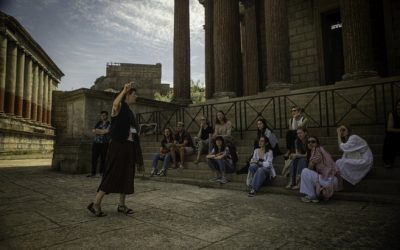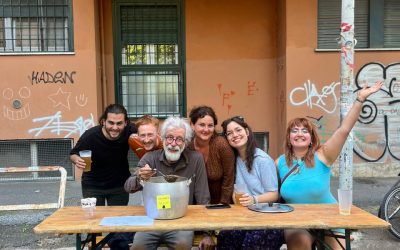Intercultural dialogue
Unique adventure in Japan
Belgium
Japan
Belgium
Japan
Other SCI experience
Written by Yann Benavente from Belgium
DISCOVERING JAPAN AND ITS CULTURE
I went to Japan for over 70 days thanks to SCI Belgium. Japan is a beautiful country, it has always fascinated me and I dreamed of being able to discover it one day. I discovered a culture that I did not know with diverse and varied landscapes. I have been to big cities like Tokyo, but I have also been in small villages far from big cities. This is how I got to know many aspects of Japan. This trip allowed me to escape from the life I lived in Brussels and live a different life from the one I already knew.
THE FIRST SURPRISES
A few days before my first solo trip to a country that was unknown to me on the other side of the world, Covid-19 was starting to become a real concern in Europe. Despite everything, I decided to fly to Tokyo in order to participate in my first two volunteering projects. When I arrived, I was confused by many elements, such as the atypical toilets, the jet lag and the unexpected discovery of the low level of English of the Japanese, something that I wasn’t prepared for. At night, in central Tokyo, I didn’t really realize what I was going through: I walked down the streets watching the lights and people passing by like I was in a movie. During my first moments in this country that I did not know, I discovered in the metro a sample of Japanese culture: tranquillity and good manners.
MEETINGS AND GROUP LIFE AT HIMI
The day after my arrival, I went to Toyama Prefecture from Tokyo main station, where I felt like people were walking around like ants.
When I arrived in the small town of Takaoka I joined the volunteers, a member of the organization and the host of the project who then took us to the small village, Himi, and showed us the house in which we were going to live. A magnificent traditional house.
That day and the next we had to introduce ourselves to all the inhabitants of the village to explain to them the reasons for our presence because it was the first time that this project was carried out and they were not used to see Europeans or young Japanese from urban areas.
From then on, the project really started. The volunteers, who were all girls, were older than I, all Japanese except one, who was Spanish. They integrated me straight away and we got along very quickly; I quickly felt at ease even though I had recently known them. Community life with these people was rich in exchanges, conversations and learning. We talked a lot about the cultural and societal differences that often surprised me. For example, the roles of father and mother which are strongly predefined there or the fact that people are so introverted and shy that it is almost impossible to see a student raise their hand to ask a question in class.
We then met the people we were going to work with. Starting with the old man who grew mushrooms, Rokuta-san, to whom I got very attached. The language barrier did not prevent us from laughing and creating a friendly relationship. I was also able to build a very strong bond with the potato growers who were very patient and educated with us, I had the feeling that they really wanted to pass their knowledge on to us. They were very generous people, one of her, a manga writer, even offered me two of her books.
During this project, I developed an ability to adapt to a life corresponding to a culture very different from mine.
WORK AND SOLITARY LIFE IN WAZUKA
My second project was very different from the first one I had just experienced. While I had lived in community during my first project, I started the second alone. It was the first time I felt that I was alone and far from home. Thanks to that, I learned to rely on myself. Despite the fact that I lived with two other people in the house where I was staying and that I got along well with the inhabitants, we were far from the community life that I had experienced during my first project. I learned to cook myself, to do washing machines, etc. I worked in the tea and rice fields in Wazuka village, and had two days off a week. The work was very tiring and since I had never worked in my life, I was able to experience the life of a real worker. One of the locals had lent me a bicycle and this allowed me to explore the village I was staying in and its surroundings.
While in Belgium, drastic measures were taken to protect against Covid-19, in Japan it was not at all the same, especially in the village where I was. I was living a good life and at that time I didn’t yet know the meaning of the word confinement, I felt like in a bubble and I didn’t realize what my Belgian friends might be feeling when they told me what they were living.
I think this project allowed me to acquire more maturity and that I was able to discover more about myself.
TUMULOUS RETURN
My return to Belgium was complicated. Because of the Covid my flight was cancelled and every time I took a new one it was cancelled too. I was finally able to go home. On my return, I really realized the cultural difference between the two countries. In addition, since the sanitary measures were very strict in Europe, I was quickly brought back to the Belgian reality.
I think this trip has given me a lot. As I was alone in an unfamiliar country, I had to make quick efforts to adapt to the change. I discovered a new culture, and new landscapes that I had only seen in movies until then. I have created strong and solid friendships with the people I met during my time in Japan. I made unforgettable memories and had amazing experiences. There were of course times that were harder than others but that is part of the experience, and I grew by overcoming those more difficult times. I realized that I was able to cope on my own in a country where I didn’t know the language and that I didn’t know that much. I would advise anyone to embark on this kind of experience.
Yann Benavente
Volunteer at SCI Belgium
You can still join!
Want to have your own volunteer experience for peace?
Read more Voices of Volunteers




